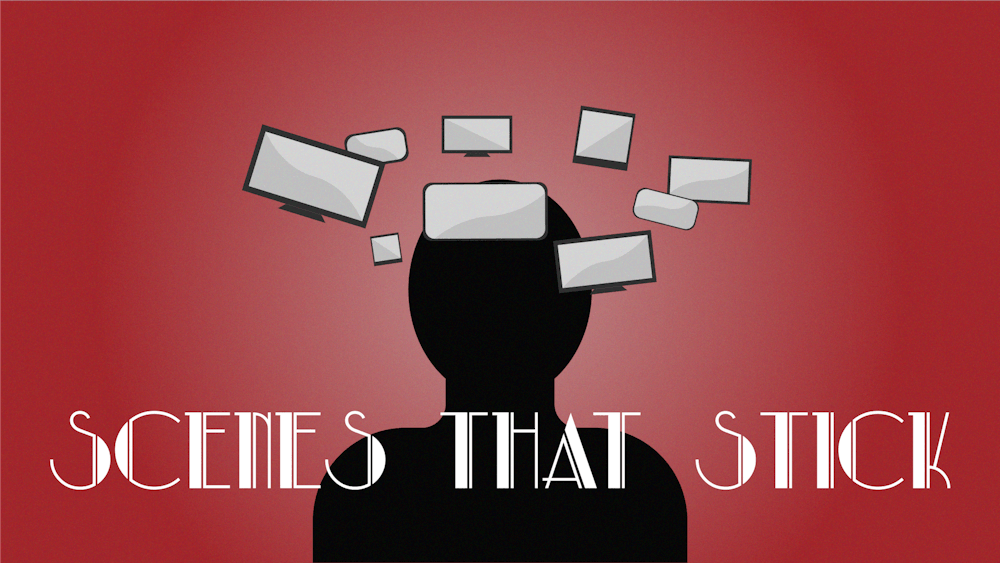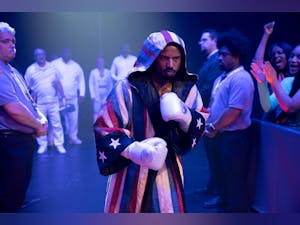From: Silver Screen
Scenes that Stick: The obsession with success in ‘Whiplash’

Sometimes good is not enough. To be the best, to become a household name, one cannot just simply be good. One must be broken down to your core, look at yourself in the mirror and ask yourself if you have what it takes to be the best. The last scene of “Whiplash” explores this theme of success and asks, considering the sacrifices, was it worth it?
Whiplash is the story of how a backup jazz drummer can turn into the next Charlie Parker with the help of a mentor who is obsessed with perfection. Andrew Neiman (Miles Teller) is a first-year drummer at an elite music conservatory who has high ambitions but little self-worth. Terence Fletcher (J.K. Simmons) is the instructor for the top jazz band at the conservatory and is looking for players, which is where he stumbles into Andrew. Fletcher invites Andrew to play for him and Andrew accepts, but he was too naive to know how Fletcher instructed his band.
Fletcher abuses Andrew for months — verbally and physically assaulting Andrew and indoctrinating him with his idea of how to become the best. Andrew’s aspiration to be at the top blinds him to his instructor’s abuse, and he starts associating being successful with appeasing Fletcher. The mentorship leads Andrew to end his relationship with his girlfriend, distance himself from his father and suffer endless physical injuries. He is eventually kicked off of the conservatory for assaulting Fletcher during a concert after having a breakdown from the months of inflicted psychological pain. But, in the process, Andrew becomes a top-notch jazz drummer and his confidence improves.
One would think Andrew would quit jazz after those months of suffering, but his obsession to satisfy Fletcher overtakes him. He stumbles into Fletcher months after his mental breakdown, and his abusive instructor tells him the story of how legendary Jazz saxophonist Charlie Parker became the perfect musician. Andrew identifies with Charlie Parker in this story, and his obsession kicks in once more. When Fletcher invites him to play at a professional concert with his own jazz band, Andrew hesitates, knowing how much pain Fletcher inflicted on him but accepts. The concert is the make or break for Andrew’s jazz career but more importantly, it is his final chance to prove his worth to Fletcher.
The final concert scene makes viewers rethink how much of their hard work and resilience was done to satisfy themselves or just to prove themselves to someone.
Andrew steps on stage feeling confident, as Fletcher has trusted him to be in his band once more. He was too naive, again. Fletcher told Andrew that the band would play his old jazz band music, but when the band begins to play, Andrew notices he has never heard of the music the band was actually playing. Fletcher lied to him; the invitation was a ploy to get vengeance because Fletcher was kicked off of the conservatory due to his abusive conduct. After all, he does not think Andrew has what it takes to become the best. A lost, confused and betrayed Andrew sits in front of the audience watching Fletcher smirk at him. Andrew runs from the set backstage toward his father and hugs him desperately.
Teller's performance is something to admire. He punctuates this scene not only with tension but also with sadness and disappointment. Director Damien Chazelle’s writing makes the viewer fear for Andrew’s failure.
This moment of defeat is when Andrew realizes that all of the months of suffering, indoctrination and practice led to this moment. Andrew goes back on stage and starts drumming his heart out. Sweat and blood streaming down his hand, he cues the rest of the band and continues to play like never before. Fletcher cannot believe what he is witnessing: perfection. His teachings were paying off for once. The song ends, the lights turn off, but Andrew keeps playing. He has a point to prove. Fletcher stands in awe, even helping Andrew as his cymbal falls to the ground. Andrew reaches the climax and end of his solo, and, exhausted, looks up at Fletcher for his reaction. Fletcher meets his eyes and smiles knowing he has succeeded. Andrew’s face lights up with accomplishment and he smiles. He has played an awe-inspiring set and finally satisfied his instructor.
While Andrew was able to succeed, his final performance leads the audience to question if his suffering was worth it. Sure, Andrew was ambitious, but had it not been because of Fletcher’s own obsession he could not have become that last jazz drummer the viewer sees. The final scene leaves the viewer struggling for a concrete conclusion. The audience does not know if Andrew became a great, but knows that he is satisfied. Does success in Andrew’s eyes mean proving he was a great drummer or appeasing Fletcher to prove him wrong?




